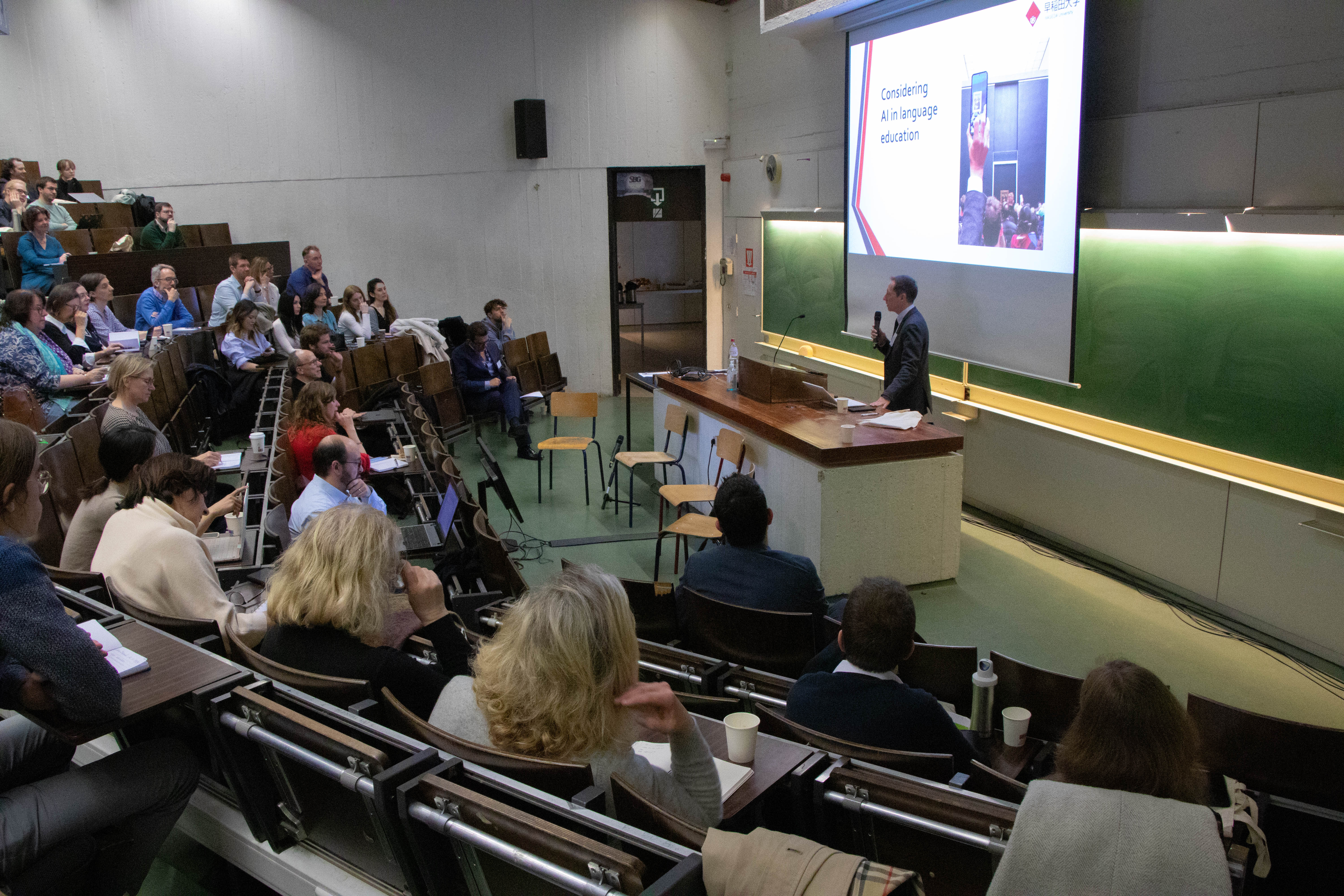Already a user?Log inTechnical Support
Professor Glenn Stockwell Sheds Light on the Use of AI in Language Teaching – 5 Tips and Warnings for Incorporating AI into Teaching
22 May 2024
At the end of March 2024, the Altissia Chair had the pleasure of hosting Professor Glenn Stockwell at the Université de Saint Louis in Brussels for an exceptional conference on the use of Artificial Intelligence (AI) in language teaching. This was the perfect occasion for Professor Stockwell to share his expertise in this field with us. The Altissia Chair continued to explore the links between technology and foreign language teaching by inviting this renowned figure in research on these topics, so here’s a look back at Professor Stockwell’s presentation and, at the end of the article, an overview of the main avenues he explored.
Technology in Constant Evolution
The first point that Professor Stockwell raised is the fact that AI technology is not new. It first appeared in the early 1980s and has therefore been evolving ever since to become what it is today. This implies that further changes and improvements are to come in the very near future, as we have seen with the star of chatbots, Chat GPT, which, with the release of its version 4.0, has become around five million times more powerful than it was previously.
A Necessary Change in Perception
Professor Stockwell then addressed a key point in his presentation, regarding our perception of Artificial Intelligence in the teaching environment. He argued that now that the technology is here, we cannot ignore it. AI represents a huge change for the education sector, and there are already many that use it. The solution, therefore, does not entail avoiding using AI, but rather learning how to work with it. He also highlighted that AI is still very new technology in the field of education and is currently in a phase of uncertainty whereby we are overestimating the impact it will have; when tablets were first released, many believed that this spelled the end of using pens and paper at school, however we now know that this is far from the case.
Adapting Assessment
As previously mentioned, ignoring this technology is not the solution – implementing it is. This implementation will involve adapting assessment methods. As we all know, students are already using this technology and so the decision to implement it or not is no longer ours alone. A teacher cannot write an assignment using AI only for their students to answer it also using AI – the goal remains teaching students new things, and AI should support them in their tasks, not do the work for them. Although the use of this technology is not (yet) part of teacher training, teachers must come together to set standards for its use as soon as possible.
In short, Professor Stockwell is urging us to embrace AI tools and learn to use them instead of distrusting them. They can be invaluable for time saving, but they are not without their risks – artificial intelligence is neither perfect nor infallible.
5 Tips and Warnings
Here are the five main tips and warnings for implementing AI, as set out by Professor Stockwell in his presentation and in the following discussion panel with Arnaud Vincent, secondary school language teacher and researcher, and Lucie Niclaes, Modern Languages and Literature student at UCLouvain.
- Using and mastering AI tools: Recommend and advise against certain practices. This could involve encouraging its use for: "brainstorming", "proofreading", "support with work" and "help with structuring work".
- Discuss it openly with students: Ask them for their opinion on your potential use of AI and invite them to share their experience.
- Adapt your assessment methods: If the majority of your students use AI, this should be taken into account in your assessment methods.
- Beware of hallucination: AI has a tendency to invent plausible facts that are actually entirely false, so anything produced by AI must always be proofread carefully.
- AI is not human: It cannot inspire a student like a good teacher can, and so the human dimension remains paramount.
Conclusion
In conclusion, it is clear that Professor Stockwell advocates the use of AI in language teaching, within reason. AI can undoubtedly be an excellent tool in this domain if it is used correctly. Lack of understanding is still a barrier that must be quickly overcome if we are to use AI to speed up the creation process or to support our students in their work, for example. Limitations of its use still need to be clearly defined, as AI cannot just be used in any way.



